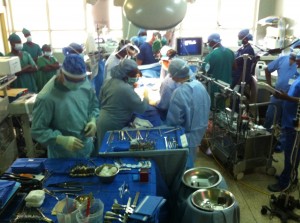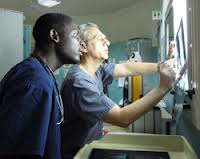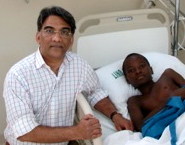Ghana has been viewed as one of Africa’s most stable democracies, becoming a republic in July 1960. It is the first African nation to achieve independence from its colonial heritage under the United Kingdom in 1957.
Very few West African countries have the resources to provide optimum cardiac care to their populations. Cardiac surgery requires relatively sophisticated diagnostic and surgical techniques and high level infrastructure operated by personnel with advanced training and expertise.
The availability of cardiac surgeons per million of the population in North America and Europe is more than ten times the figure for Africa. The treatment costs related to diagnosis and treatment of heart disease is way beyond the means of the largely indigent population in West Africa. Large numbers of patients in West Africa lack the resources to access whatever treatment is available locally. The few citizens who can afford cardiac surgery resort to seeking treatment abroad.
The National Cardiothoracic Centre is performing a small number of cases each year (approximately, 100, mostly congenital and valves). Accra cannot do more than a small volume of cases due to varying types of restrictions, and some of these are fee-paying private cases.
The Komfo Anokye Teaching Hospital (KATH) in Kumasi has already received assistance from teams, which includes Dr. Philip Wendschuh, a cardiologist volunteer member with CardioStart, the Mayo Clinic, led by Dr. Lewis Roberts, and the Boston Children’s Hospital under the direction of Dr. Fynn-Thompson.
CardioStart professionals performed the first cardiac surgeries in the new Trauma and ER facility at KATH in Kumasi, in February
2009. A total of 8 procedures were performed and the facilities were tested as fit for purpose. During its second visit in 2010 CardioStart performed a total of 11 procedures.
CardioStart is planning its third mission to Ghana between April14– 28,2013. Led by Mission Director Dr. Uday Dandekar, the preparation for this mission is well under way. Most volunteers have been chosen and a very few positions remain to be filled.
The objectives of the current mission are largely twofold:
1. PROVIDE CARDIAC SURGERY FOR ADULTS OF THE REGION
The first two days of the mission on reaching Kumasi will be spent in setting up. To convert an empty theatre and ITU to a functional cardiac facility. Working in collaboration with the KATH surgeons, physicians, nurses, laboratory and perfusion staff, CardioStart will prepare a surgery suite and intensive care unit for its first patients.
 The CardioStart team hopes to perform 15-20 procedures on adult patients. These would be a combination of pacemakers and open heart surgery which would be largely valvular secondary to rheumatic fever. For most of these patients, heart surgery is the only realistic hope for better quality and quantity of life. A large number of them are very symptomatic and have been waiting for surgical option certainly for months and most cases few years. Organizations like CardioStart and others are their only ray of hope. The pediatric population is being served by the Boston group.
The CardioStart team hopes to perform 15-20 procedures on adult patients. These would be a combination of pacemakers and open heart surgery which would be largely valvular secondary to rheumatic fever. For most of these patients, heart surgery is the only realistic hope for better quality and quantity of life. A large number of them are very symptomatic and have been waiting for surgical option certainly for months and most cases few years. Organizations like CardioStart and others are their only ray of hope. The pediatric population is being served by the Boston group.
The ultimate aim for CardioStart would be for the local team to progressively take over their own program. This will be facilitated by repeating visits from volunteer teams to help advance procedures that can be taken on. This might take at least 5 if not 10 years.
2. TEACHING AND TRAINING
Education will be the key in all areas of the program during this mission. Each volunteer will contribute towards informal teaching during the course of the mission. Formal teaching will also be organized and addressed to residents and senior doctors.
THE FUTURE OF CARDIAC SURGERY IN GHANA
The development of cardiothoracic surgery appears to closely parallel economic development. Roughly 42% of all cardiothoracic surgeons practise in North America and 32% in Europe. Africa has only 1% of the world’s cardiothoracic surgeons at its disposal. There is only one cardiothoracic surgeon for 4 million inhabitants in Africa compared to 28 per million in Western Europe and North America.
Economic development should lead to a commensurate development of cardiothoracic surgery in the sub-region. The critical link between political stability and economic growth draws a secondary link between political stability and the regional/national development of cardiothoracic surgery.
Ghana has enjoyed a reasonably stable political climate and a modest economic growth since 1990. Further growth in cardiac program can be sustained if the economy is managed prudently and healthcare policy decisions are made in terms of cardiovascular disease prevention, infrastructural layouts, staff training, and retention.
“We know only too well that what we are doing is nothing more than a drop in the ocean. But if the drop were not there, the ocean would be missing something.”
–Mother Teresa


Leave A Comment